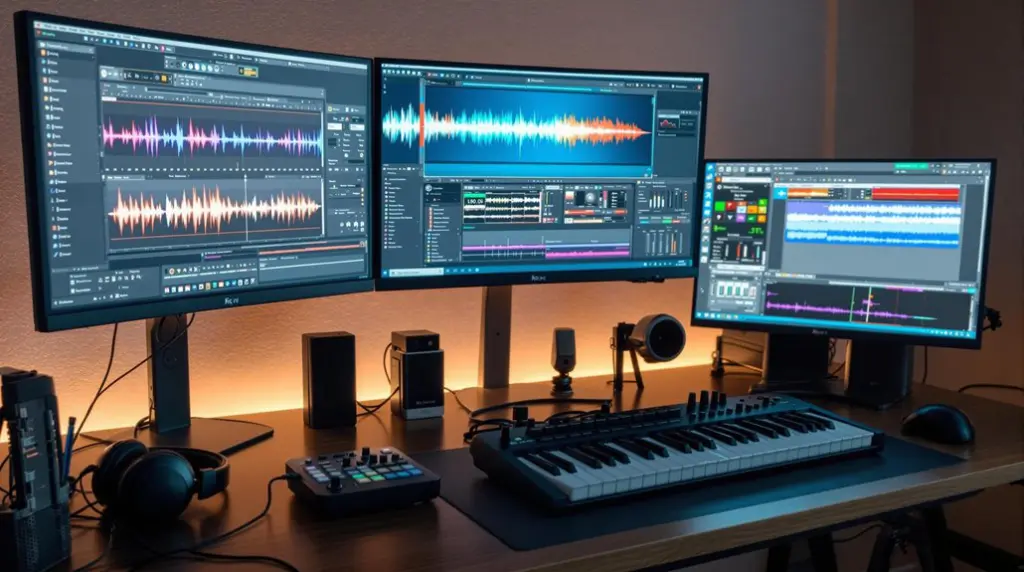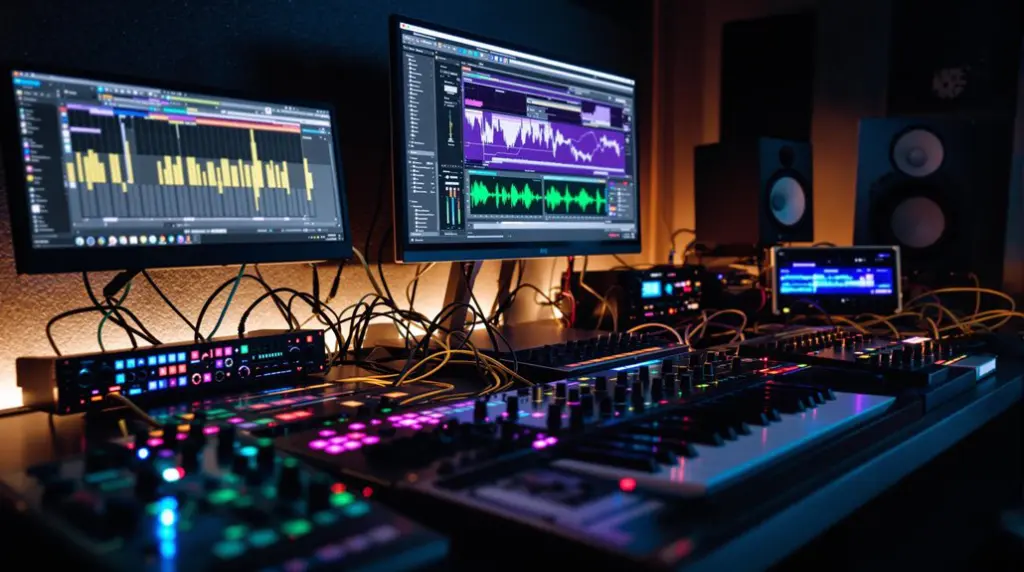The Native Instruments Monark VST Plugin is a must-have for its authentic Minimoog emulation, driven by advanced Zero-Delay Feedback filter technology, offering natural resonance and exceptional sonic shaping. It features three oscillators and extensive glide and ADSR envelope options for expressive sound design. The plugin’s intuitive interface balances a retro aesthetic with modern functionality, while VCO3 modulation rates and deep customization cater to both novices and experts. Priced competitively at $99, Monark excels in delivering robust analog sound with vibrant low-end punch. The journey into the depths of its capabilities promises more exciting discoveries.
Key Takeaways
- Emulates the iconic Minimoog sound with precision, delivering authentic analog warmth and rich bass frequencies.
- Advanced Zero-Delay Feedback filter technology ensures natural resonance and smooth tonal shaping.
- Priced at €99/$99, offering exceptional value for quality sound synthesis and customization.
- Seamless integration with popular DAWs like Ableton Live enhances workflow efficiency.
- Extensive customization options and intuitive interface cater to both novice and experienced sound designers.
Overview and Functionality
Native Instruments’ Monark synthesizer stands out as a meticulously crafted software instrument that emulates the iconic Minimoog sound, seamlessly integrating into Reaktor 5 or the free Reaktor 5 Player.
Monark’s monophonic synthesis excels in producing rich, vibrant tones through its three primary oscillator types. These oscillators, each offering unique harmonic content, include sawtooth, triangle, and square waves, with a distinct capability for slight detuning that imbues the sound with natural warmth and complexity.
To further refine your mix, consider using high-pass filters to eliminate any unnecessary low frequencies.
The advanced filter technology embedded within Monark utilizes Zero-Delay Feedback, ensuring natural resonance and precise sonic shaping. Users can explore multiple filter options, including 12dB/6dB low-pass and band-pass settings, which provide a broad spectrum of tonal possibilities.
This flexibility allows for intricate manipulation of the harmonic structure, facilitating an authentic analog emulation that captures the essence of the original Minimoog.
The precision in Monark’s oscillator and filter design is matched by its affordability, priced at £89 including VAT or $99 in the US.
This accessibility makes it an appealing choice for musicians and producers seeking superior analog sound synthesis without compromising on quality or breaking the bank.
User Interface
With a strikingly clean and visually appealing dark color scheme, the user interface of NI Monark masterfully balances the nostalgic allure of the classic Minimoog with contemporary design elements. This blend of old and new in the design aesthetics not only pays homage to the revered analog synthesizer but also enhances the user experience for both novice and seasoned sound designers.
The customizable features of Monark further enhance navigation and workflow efficiency, making it a versatile tool for various production needs.
Key features of the NI Monark user interface include:
- Intuitive Knobs and Switches: The interface is adorned with thoughtfully designed knobs and switches, which are highly responsive and allow for precise control over sound parameters. This is particularly beneficial for live performances and studio sessions where swift adjustments are essential.
- B Button for Additional Controls: The inclusion of a B button reveals a back panel, offering users access to a deeper level of customization and sound manipulation. This design choice guarantees that advanced features are available without cluttering the primary interface.
- Seamless DAW Integration: Monark’s interface integrates effortlessly with popular Digital Audio Workstations (DAWs) like Ableton Live. This seamless integration fosters a smooth workflow, enabling users to focus on creativity rather than technical hurdles.
These elements collectively create a streamlined and efficient user experience, making Monark a standout in the domain of software synthesizers.
Sound Design
Monark’s sound-design capabilities are a demonstration of its robust engineering and attention to detail, offering sound designers an extensive toolkit for crafting monophonic textures. Central to this prowess are its three bold oscillators, capable of producing a diverse range of waveforms including triangle, sine, saw, and pulse. This waveform variety empowers sound designers to explore a rich palette of sonic possibilities, from warm, rounded bass tones to sharp, cutting leads.
For those seeking even more flexibility, Monark’s interface is intuitive, allowing for precise tweaking to achieve the desired sonic character.
Monark’s filter technology is another standout feature, employing Zero-Delay Feedback to achieve natural resonance and smooth tonal shaping. This sophisticated approach allows for precise control over the sound’s timbre, with adjustable feedback settings enhancing the depth and character of the synthesized tones.
The glide options in Monark further extend its expressive capabilities, offering both constant rate and legato glide settings. These synth techniques enable fluid shifts between notes, adding a level of expressiveness that is essential for creating dynamic, emotive performances.
Moreover, the ADSR envelopes in Monark maintain their state for seamless shifts, ensuring smooth and punchy envelope responses. Coupled with retro-inspired presets, users are encouraged to investigate custom patch creation, fostering an environment ripe for unique sound design exploration.
Performance and Comparison
Monark’s performance excels in delivering classic analog emulation, capturing the rich, vibrant essence of the Minimoog with precision.
Its customization options, including adjustable VCO3 modulation rates and three distinct Minimoog settings, provide substantial flexibility for diverse playing styles.
When compared to traditional hardware like the Sub Phatty, Monark stands out with its impressive low end and envelope punch, despite minor background noise discrepancies.
For those looking to enhance their sound design capabilities, Monark’s intuitive interface and robust features make it a valuable tool in any producer’s arsenal.
Classic Analog Emulation
An impressive hallmark of Native Instruments Monark is its adept classic analog emulation, meticulously designed to capture the iconic sound of the Minimoog. This VST plugin excels in delivering sound nostalgia and vintage appeal, thanks to its rich, vibrant oscillators and cutting-edge Zero-Delay Feedback filter technology. The result is an authentic replication of the Minimoog’s legendary tonal characteristics.
Monark’s emulation prowess extends to its low-end response and envelope punch, which are particularly remarkable. This makes it an excellent choice for both bass and lead sounds, providing users with the classic analog warmth that traditional synth enthusiasts crave.
The plugin allows for further tonal customization, including three distinct Minimoog configurations:
- Rich Oscillators: Monark captures the warm, thick sound of vintage oscillators, offering a sonic depth that harks back to the original analog synths.
- Zero-Delay Feedback Filter: This advanced technology guarantees precise and dynamic filter responses, essential for achieving the Minimoog’s signature sound.
- VCO3 Modulation and Note Priority: Adjustable settings enhance playability and sound dynamics, accommodating various playing styles.
Compared to other software and hardware synthesizers, Monark stands out for its authentic sound quality, making it a top choice for those seeking a true vintage synth experience.
Customization and Flexibility
Customization and flexibility define the core strengths of Native Instruments Monark, propelling it beyond mere vintage emulation into a domain of nuanced sound design. Monark offers extensive customization options, allowing sound designers to fine-tune VCO3 modulation rates and select between different glide settings for precise note control. This level of detail empowers users to craft sounds that fit a wide range of musical genres.
Monark’s three distinct Minimoog settings provide users with varied tonal characteristics, enabling seamless adaptation to different musical styles. Further enhancing its versatility, the synthesizer allows manipulation of filter types between 12dB/6dB low-pass and band-pass options. This adaptability is a game-changer for sound designers seeking a broad palette of sonic possibilities.
User experiences frequently highlight Monark’s seamless integration with Reaktor, revealing additional LFOs and modulation sources. This integration greatly enhances Monark’s versatility, allowing for complex soundscapes and intricate modulations. The platform also facilitates easy preset sharing, fostering a collaborative community where users can exchange custom sounds and techniques.
In performance, Monark aligns with classic analog expectations, delivering impressive low-end presence and punchy envelopes. These features, combined with its customization capabilities, solidify Monark as a top-tier choice for both novice and experienced sound designers.
Sound Quality Comparison
Moving from the extensive customization capabilities, the sound quality of Native Instruments Monark stands as a demonstration to its sophisticated engineering and commitment to analog authenticity. At its core, Monark’s oscillator characteristics deliver a rich, vibrant sound with unique harmonic content and slight detuning, meticulously emulating the classic Minimoog character. This analog-like warmth and depth set the stage for a highly expressive performance.
Monark’s advanced Zero-Delay Feedback filter technology further enhances its sound profile, providing natural resonance and tonal variation. Users can adjust feedback settings to achieve a wide range of sonic textures, from subtle warmth to aggressive resonance. The filter versatility is particularly notable with options such as 12dB/6dB low-pass and band-pass filters, allowing for refined sound sculpting.
In a direct comparison to a friend’s Minimoog, Monark captures the essence of the original analog synth, though slight differences in sound identity can arise due to factors like background noise. The overall performance of Monark impressively aligns with expectations for classic analog emulation, delivering:
- Impressive low end: Rich bass frequencies that provide a solid foundation.
- Punchy envelopes: Snappy and responsive, ideal for percussive sounds.
- Versatile filters: Multiple filter types enable a broad spectrum of tonal possibilities.
Pricing and Value
Priced at €99 in Europe and $99 in the US, Native Instruments Monark offers a budget-friendly entry into high-fidelity sound synthesis, making it an attractive option for both novice and seasoned producers.
Its ability to emulate the iconic Minimoog sound with remarkable accuracy, combined with a lightweight 29.2 MB installation, underscores its impressive value proposition.
Compared to more expensive hardware synths and other software alternatives, Monark stands out for its competitive pricing and robust feature set, encouraging extensive sound design customization to maximize its utility.
Competitive Pricing
In the domain of software synthesizers, Native Instruments’ Monark stands out not only for its high-quality sound but also for its competitive pricing. Priced at €99 in Europe and $99 in the US, Monark is an affordable option in the market, offering authentic Minimoog sound emulation. This pricing strategy positions Monark favorably in the market, making it a compelling choice for both novice and seasoned musicians.
To provide a detailed analysis, let’s consider the following points:
- Market Positioning: Monark’s price point allows it to compete effectively against other premium software synths. While many competitors are priced higher, Monark delivers a comparable, if not superior, sound experience.
- Price Comparison: When juxtaposed with hardware synthesizers, Monark offers exceptional value. Hardware units that replicate Minimoog sounds can cost several thousand dollars, making Monark a cost-effective alternative without sacrificing sound quality.
- Overall Value: Despite requiring the Native Instruments’ Reaktor framework, users frequently find Monark’s sonic capabilities justify the additional expense. The combination of affordability and high fidelity makes it a preferred choice in the field of software synths.
Feature-Rich Value
Monark by Native Instruments is a feature-rich VST plugin that delivers exceptional value for its price, especially for vintage synth enthusiasts. Priced at £89 including VAT in the UK and $99 in the US, Monark stands out as an affordable yet high-quality software synthesis option.
The compact file size of just 29.2 MB guarantees swift download and installation, enhancing the user experience by making it accessible across various systems.
Monark operates within the Reaktor environment, which adds further value for those already invested in Native Instruments’ ecosystem. This integration allows users to leverage the extensive capabilities of Reaktor or the free Reaktor Player, amplifying the feature benefits of Monark.
The plugin’s sound quality is particularly remarkable, faithfully capturing the warm, rich tones characteristic of the classic Minimoog, a feature that appeals to both novice and veteran sound designers.
Despite some limitations in factory presets, Monark shines in its ability to create custom patches. This flexibility allows users to explore the full potential of the plugin, guaranteeing long-term value through its versatility in sound design.
Monark’s feature-rich attributes and exceptional pricing make it a compelling choice for any digital audio workstation setup.
Affordable Quality
Often hailed for its cost-efficiency, Monark establishes a benchmark in the domain of affordable quality synthesizers. Priced at €99 or $99, Monark is a budget friendly alternative to the often prohibitively expensive hardware synthesizers, making synthesizer accessibility a reality for a wider audience of musicians.
Its competitive value is particularly notable for those seeking to emulate the classic Minimoog sounds without the financial burden of purchasing the actual hardware.
Monark’s pricing and value are underscored by several key factors:
- Exceptional Sound Quality: Despite its accessible price, Monark delivers sound quality that rivals many hardware synths, making it an excellent cost-effective solution for bass and lead synthesis.
- Compact Size and Efficiency: With a modest file size of just 29.2 MB, Monark guarantees swift download and installation processes, thereby enhancing its overall value proposition for users who prioritize efficiency.
- User Approval: Feedback from both novice and seasoned sound designers highlights that Monark’s sound quality and versatility justify its price, making it a highly recommended choice in the market.
Community and Support
Engaging with the community and accessing support for the Native Instruments Monark VST Plugin is essential for maximizing its potential. Community engagement on platforms like the Gearspace forum fosters a vibrant environment where synthesizer enthusiasts can discuss their experiences, share insights, and collaborate on sound design projects.
This user collaboration creates a rich tapestry of shared knowledge, making it easier for both novice and seasoned users to explore Monark’s capabilities. The collaborative AI-human interfaces present in today’s music tools can also enhance the creative process, offering a blend of technological and human input in sound design.
Native Instruments enhances user experience by providing access to user-generated content and modifications through their website. This not only expands Monark’s functionality but also allows users to customize their soundscapes, guaranteeing a unique sonic signature.
The availability of community support through active discussion threads addresses a wide array of topics, from troubleshooting issues to advanced sound design techniques. Engagement with industry experts and fellow musicians in these forums encourages continuous learning and innovation.
Membership benefits in these communities often include exclusive discussions, giveaways, and classifieds, adding considerable value for synthesizer aficionados. All these elements collectively guarantee that the Native Instruments Monark VST Plugin is not just a tool, but a gateway to a collaborative and supportive ecosystem, enriching the overall user experience.
Frequently Asked Questions
Is MONARK a Good Synth?
Monark is an excellent synthesizer, offering unparalleled analog warmth and exceptional sound design capabilities. Its authentic Minimoog emulation, high sample rate optimization, and extensive customization options make it a top choice for both novice and professional sound designers.
What Synth Is MONARK Based On?
Monark is based on the iconic Mini Moog Model D synthesizer. Monark features include three oscillators and a 24dB Moog ladder filter, ensuring authentic replication. Monark presets offer extensive tonal diversity, capturing the classic analog essence.
How Much Is MONARK Synth?
The Native Instruments Monark synthesizer is priced at approximately €99, including VAT, or $99 in the US. This cost underscores Monark’s features and usability, providing exceptional sound quality and an authentic analog experience at an affordable price.
Is Native Instruments a VST?
Native Instruments produces several VST-compatible instruments and effects. Their plugins, including Monark, are renowned for their robust plugin features, such as authentic analog emulation and seamless DAW integration, making them essential tools for professional music production.
Conclusion
The Native Instruments Monark VST plugin exemplifies excellence in virtual synthesizer technology through its robust functionality, intuitive user interface, and superior sound design capabilities. Its performance, when compared to other plugins, demonstrates unparalleled precision and authenticity. The pricing structure, combined with the extensive community and support network, renders Monark a valuable investment for both novice and seasoned music producers. Monark stands out as a quintessential tool for high-fidelity sound synthesis and audio production.




